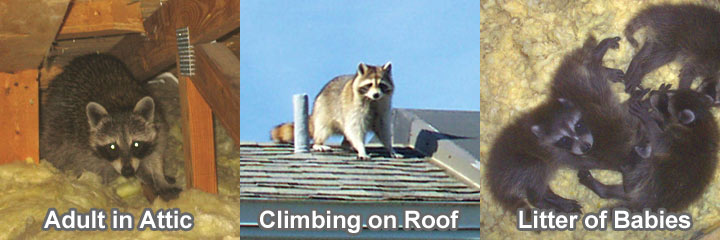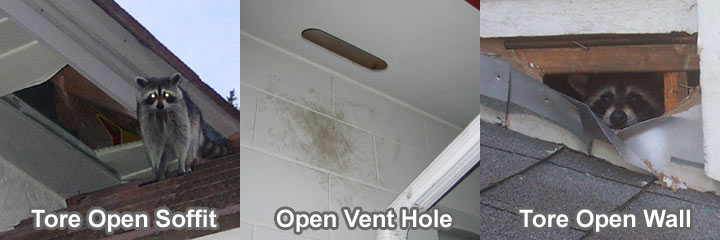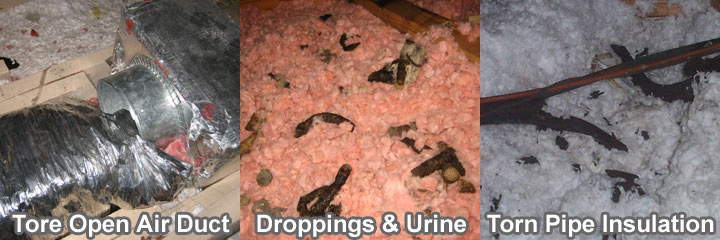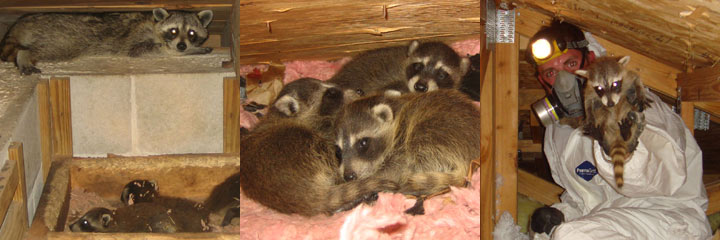24/7 Cell Phone: 703-881-3164




Alexandria Virginia Raccoon Control Situation: Raccoons carry infections and viruses that can be easily passed on to human beings and animals. The germs can be transmitted through feces, urine, saliva and bites from the raccoon. Raccoons can shed bacteria and parasites in water tanks, pools and vegetable patches as well. Direct or indirect exposure to these germs can lead to serious illnesses.
It is important to know about the source and symptoms of these diseases because raccoons are a common problem in residential areas now. They hunt for food in waste bins, bird feeders and gardens, and can leave germs and viruses where ever they go. Raccoon infestation can become a big problem and people who come in contact with them or their waste need to take extra caution when removing them from the premises. Professionals have appropriate trainings and tools available to handle such situations, and should be contacted for assistance.
The deadliest virus that raccoons carry is rabies. Not every raccoon is rabid, but is a potential host for the virus. Raccoons can spread rabies through their saliva, biting or scratching a person or animal. The symptoms of rabies appear a bit late but treatment should be taken immediately. If the vaccine is not taken immediately after exposure, it can lead to fatal consequences. Some indications of a rabies infected person are fever, seizure and hallucination.
The other common parasite that raccoons carry is the roundworm also known as Raccoon Ascarid or Baylisascaris procyonis in medical terms. This parasite lives in the intestine of raccoons, and roundworm shed their eggs through raccoon's feces. The eggs do not carry much weight and can transfuse through air. Thus, a person can get infected through inhalation near raccoon feces as well. A human shows signs of infections after 2-4 weeks of incubation of the eggs. The infection can lead to a serious illness called Visceral Larval Migrans which can affect a person's nervous system. Some implications of the disease involve loss of vision and sometimes even coma.
Another kind of infection that raccoons carry is caused by a bacteria and is called Leptospirosis. The bacteria can be easily transmitted through water contamination. Raccoons shed Leptospirosis bacteria through urine and saliva secretions. Exposure to open wounds or oral ingestion can also lead to infection. In mild cases, the infected person exhibits symptoms like high fever, vomiting, body pain and diarrhea. In serious cases, the person can suffer from meningitis, anemia or even liver failure.
Other diseases caused by raccoon are salmonella also called E. Coli, fungal infections, Giardia lamblia, Tularemia, Trypanosoma cruzi and Tetanus. These are not as fatal as rabies, but are considered dangerous, and in serious conditions can lead to heart failure. Raccoons do not always exhibit the symptoms of the disease they are carrying, but exposure to these wild animals should be limited as much as possible. Pets and children should be especially taken care of in a dwelling that is close to raccoon habitat. If any contact occurs, medical help should be sought as quickly as possible.
If you wish to learn more, click on the How to Get Rid of Raccoons in the Attic home page. For wildlife control, animal trapping services, and raccoon control in Alexandria County, Virginia, call us at 703-881-3164, and ask to talk about raccoons in the attic in Alexandria, VA.